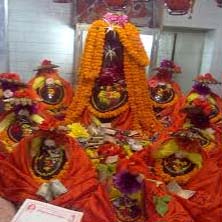Description
Rudra Ekadashini
Sri Rudram-Chamakam occupies a very important place in Vedic literature and in the practice of Vedic Religion. It is the heart of Krishna Yajurveda and is treasured in the centre of Taittiriya Samhita. Sri Rudram is known as Rudropanishad. Though it forms part of Karma Kanda, it ranks at par with the Upanishads of the Jnana Kanda. And as it is seen in all the 101 Shakhas of the Yajurveda, it is called ‘Satarudriyam’.
Among the Vidyas, the Vedas are supreme, in the Vedas the Rudra Ekadashini is supreme, in the Rudram the Panchakshari Mantra ‘NAMASIVAYA’ is supreme. In the Mantra the two letters ‘SI-VA’ is supreme. As by pouring water at the root of a tree, all its branches are nourished, so also by pleasing Rudra through Rudra Japa,all the Devas are pleased.
Dharma sasthra prescribes Rudra ekadashini as the Mahaprayaschitha. It is the pariharam (atonement) for the papas which has no other Parihara in Dharma Shastras.
Rudra Ekadashini:
Poorvangam – (Please see the page “How Homam works”)
After Kumbhasthapanam, Mahanyasam will be chanted. Mahanyasam is invoking Lord Siva in the our own body by chanting the mantras and touching the concerned part of the body. After that, first the eleven Anuvakas of Namakam is chanted, followed by the first Anuvakam of Chamakam. Next again the eleven Anuvakams of Namakam with second Anuvakam of Chamakam will be chanted. Like this for 11 full chanting of Namakam one full chanting of Chamakam is completed.
Utharangam – (Please see the page “How Homam works”)
This is how Rudra ekadashini is conducted


 WhatsApp us
WhatsApp us